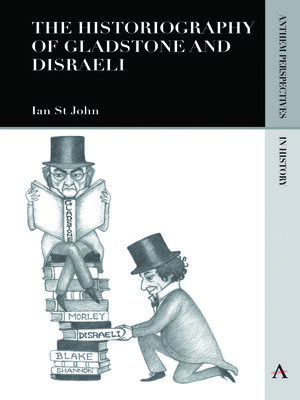
Sign up to save your library
With an OverDrive account, you can save your favorite libraries for at-a-glance information about availability. Find out more about OverDrive accounts.
Find this title in Libby, the library reading app by OverDrive.



Search for a digital library with this title
Title found at these libraries:
| Library Name | Distance |
|---|---|
| Loading... |
This book traces the often sharply differing perspectives historians have formed with regard to the key incidents in the careers of the two foremost politicians of the Victorian age – Gladstone and Disraeli. Following the parallel careers of both men, it focuses upon a series of contentious questions, ranging from why Disraeli opposed Corn Law repeal in 1846 and Gladstone abandoned his High Tory politics for Peelism, to whether Disraeli was ever an Imperialist and why Gladstone took up the cause of Irish Home Rule. By juxtaposing the contrasting interpretations advocated by historians, it brings home to students how history is a continually evolving subject in which every generation poses new questions, or reformulates answers to old ones – encouraging those studying the subject to realise that history is an ongoing dialogue to which they are called upon to contribute.
|This book traces the often sharply differing perspectives historians have formed with regard to the key incidents in the careers of the two foremost politicians of the Victorian age – Gladstone and Disraeli. Following the parallel careers of both men, it focuses upon such contentious questions as why Disraeli opposed Corn Law repeal in 1846, if and when Gladstone became a Liberal, why Disraeli oversaw the 1867 Reform Act, how successful a Chancellor of the Exchequer was Gladstone, whether Disraeli was ever an Imperialist, and why Gladstone took up the cause of Irish Home Rule. In each case it juxtaposes the various interpretations of events historians have advocated, guiding the reader through the often complicated and nuanced debates. Motivating this approach is the conviction that history is a continually evolving subject in which finality is not to be looked for. Every generation poses new questions, or reformulates answers to old ones, and nowhere has this been more apparent than in our understanding of the Victorian age, which has retained the capacity to both challenge and provoke us, and whose legacy continues to actively shape our present and future. It is this very fluidity and contestability of key historical doctrines that gives the subject its perennial attraction and ensures that every student must confront the issues for themselves, and weigh up the sometimes bewildering array of theories and explanations, so as to come to their own conclusion. This book provides a uniquely rich and comprehensive guide through the historiographical terrain of Victorian Britain and will be an invaluable asset to any student grappling with the rivalry between Gladstone and Disraeli and the issues that formed both them and the Victorian age of which we are the heirs.






